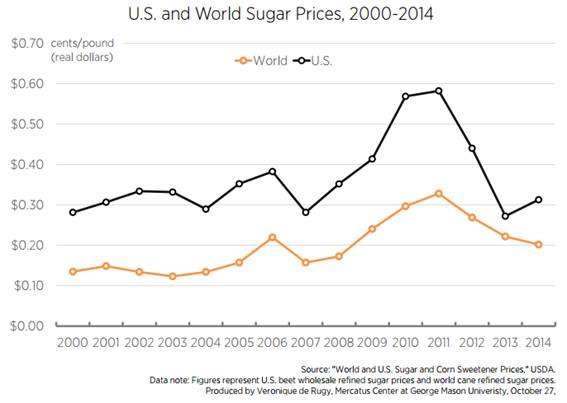Sugar Subsidies Make Halloween Candy Much More Expensive, Leave Sour After-Taste

With Halloween just days away, Americans are ready to consume a scary amount of sweets. Each year, Americans buy about 600 million pounds of candy for eager trick-or-treaters, the Neilsen Company reports. Americans consume 15 billion pounds of candy each year, so Halloween alone accounts for about 4 percent of our annual indulgence. The National Retail Federation estimates $2.2 billion in candy sales this year, up from $2.08 billion in 2013.
The price of candy is inflated thanks to federal programs designed to support U.S. makers of sugar. First, the government imposes protectionist tariffs on imports so prices aren't lowered via market competition. Then, the government sets up an industry planning board to "scientifically determine" how much output sugar companies can legally produce each year; after that, market shares assigned to preferred private corporations. Any output that exceeds a company's government quota must be stockpiled—or destroyed (the board determines the exact course of action on a case-by-case basis.) To sweeten the deal, the government extends cheap taxpayer-backed loans to these same privileged corporations.
As a result of such actions, U.S. consumers and businesses pay on average about twice the world price of sugar. Using data from the USDA's Sugar and Sweeteners Yearbook Tables, the chart above displays large discrepancies between world sugar prices and U.S. domestic sugar prices from 2000 to 2014.
These policies are incredibly costly to U.S. consumers. Economist Mark Perry estimates that "if sugar quotas were eliminated, and American consumers and business[es] had been able to purchase 100% of their sugar in 2011 at the world price (average of 31.68 cents per pound) instead of the average U.S. price of 56.22 cents, they would have saved about $3.86 billion."
The sugar high doesn't stop there. If prices happen to fall below the "optimal" level that the industry board has determined (as has been the case since 2011), then the government is ready to buy up surplus product to push prices back to the "proper" level.
That sort of cronyism is enough to sour a person on Halloween, no matter how much candy she eats on October 31.


Show Comments (88)